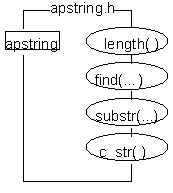name = president.substr(4,2); |
// name gets the value "in" |
firstPres = "George " + president; |
// concatenates two strings, at least one an apstring |
if ( president < "Jefferson") |
//2 strings can be compared, at least one an apstring |
cout << "true"; | |
apstring filename; | |
cin >> filename; |
// skips white space, reads one word from input stream |
ifstream infile( filename.c_str( ) ); |
// converts an apstring to a C-style string |
while ( getline (infile, president) ) |
// reads a line of characters from the input stream |
cout << president; |
// displays the entire line |
